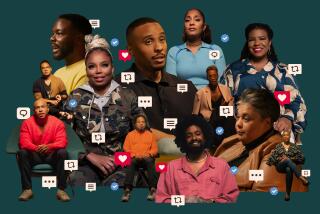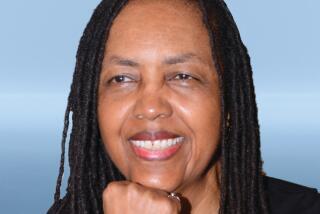Inner-City Black Youths
- Share via
The column by Gibbs paints a bleak, though accurate, picture of conditions facing young black men in our society today. I fully agree that this problem, which seems to be growing in size and complexity, is not of isolated importance. It will directly or indirectly affect every citizen of this country if the present course is not changed. The economy, and even the political stability of our government stand to be significantly affected by this situation.
However, the article omitted one major necessary element of change; an element that must come from the very ones that she wishes to help. Evidence of changed attitudes by and among black youth is needed. Said evidence might be shown by gang leaders calling a moratorium on the almost daily incidents of fratricide via drive-by shootings and such. Or perhaps the leaders within the black community might band together and make a commitment to neighborhood safety, reaffirming the sanctity of life in their neighborhoods.
Gibbs likewise mentions the possibilities that might occur if blacks were given what she terms “real” opportunities for education. I submit that real opportunities are being given daily. It is up to the blacks themselves, with help from their families, guardians, friends and teachers, to turn opportunities into accomplishments that are recognized as such by society.
Standing in the way of such accomplishment, as I see it, is the question of assimilation and identity. Many young blacks resist assimilation . . . they resist adopting the values of the larger population; values such as responsibility, industry and respectability. Though in the long-run, it might be just a phase that they can grow out of, there remains the risk that “redemption” from a desolate adolescence may not occur.
The attitudes regarding one’s “blackness” are passed from generation to generation. They are reinforced with the occurrence of every heartbreak, frustration or disappointment. Blaming the ills of one’s life on the color of one’s skin is perhaps the most difficult type of attitudinal dysfunction to overcome, because one truly cannot change one’s skin color. I find that people will live “up” or live “down” to the level of their self-esteem, and secondly to the level of respect that they hold for others.
To effect the enfranchisement of our black youths, it must become “cool” to do honest, quality work. It must be considered “righteous” to speak clearly and write intelligently. When intelligent behavior becomes the “new cool” within the black sociological structure, then they will excel. Black heroes can exist in business, commerce and industry, just as we now have them in sports, music, the arts and military. They must be encouraged to believe in themselves, and know the satisfaction of doing one’s best.
ADAM ABRAHAM
Lawndale


